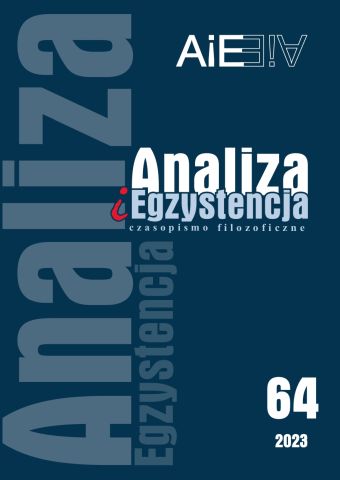
ISSN: 1734-9923
eISSN: 2300-7621
OAI
DOI: 10.18276/aie.2023.64-04





Issue archive /
64 (2023)
O t’agathon, czyli o dobru. Na podstawie Etyki nikomachejskiej I 1 1094a 1–3 w interpretacji Sebastiana Petrycego z Pilzna
(On t’agathon that is the Good on the Basis Nicomachean Ethics I 1 1094a 1-3 as Interpreted by Sebastian Petrycy of Pilzno)
| Authors: |
Maciej
Smolak

Uniwersytet Jagielloński |
| Keywords: | Aristotle good Nicomachean Ethics Sebastian Petrycy of Pilzno |
| Data publikacji całości: | 2023 |
| Page range: | 22 (69-90) |
Abstract
Aristotle opens the first chapter of the first book of the Nicomachean Ethics as follows: “Every art and every inquire, and similarly every action as well as undertaking, seem to aim at some good. Hence people have right defined that the good is that at which all things aim”. The article indicates and elucidates the difficulties found in the quoted statement on the basis of translation and commentary by Sebastian Petrycy of Pilzno.
Download file
Article file
Bibliography
| 1. | Aristote (1959). L’Éthique à Nicomaque. Komentarz R.A. Gauthier, J.Y. Jolif. T. 2, cz. 1. Louvain: Publications Universitaries. |
| 2. | Aristoteles (1549). Aristotelis Stagiritae Moralium Nicomachiorum libri decem ab Iacobo Lodoico Strebao et Io. Bernardo Feliciano a graeco in latinum conuersi. Eiusdem Strebaei in tres priores Aristotelis libros Ethicon Nikomacheion Commentaria. Tłum. z greki na łacinę Jan Bernard Felicjanus. Komentarz do ksiąg I–III Jacobus Lodoicus Strebaeus. Paris: Michel de Vascosan. |
| 3. | Aristoteles (1892). Commentaria in Aristotelem Graeca, Eustratii et Michaelis et anonyma i Ethica Nicomachea commentaria. T. XX. Berlin: Gustav Heylbut. |
| 4. | Aristoteles (1960). Nicomachische Ethik. Tłum i komentarz F. Dirlmeier. Berlin: Akademie-Verlag. |
| 5. | Aristotle (1999). The Nicomachean Ethics. Wprowadzenie, tłum. I komentarz T.H. Irwin. Wyd. 2. Indianapolis: Hackett Publishing Company. |
| 6. | Aristotle (2002). Nicomachean Ethics. Tłum. i wprowadzenie historyczne Ch. Rowe. Wprowadzenie filozoficzne i komentarz S. Broadie. Oxford: Oxford University |
| 7. | Press. |
| 8. | Aristotle (2009). The Nicomachean Ethics. Tłum. D. Ross. Wprowadzenie i przypisy L. Brown. New York: Oxford University Press. |
| 9. | Aristotle (2014). Nicomachean Ethics. Wprowadzenie, tłum. i komentarz C.D.C. Reeve. Indianapolis: Hackett Publishing Company. |
| 10. | Arystoteles (1956). Etyka nikomachejska. Tłum. wstęp i komentarz D. Gromska. Warszawa: PWN. |
| 11. | Arystoteles (2011). Etyka nikomachejska. Tłum. i komentarz Sebastian Petrycy z Pilzna. Warszawa: Hachette. |
| 12. | Aspazjusz (1889). Commentaria in Aristotelem Graeca. T. XIX, cz. 1: Aspasius in Ethica Nicomachea. Berlin: Gustav Heylbut. |
| 13. | Broadie, S. (1991). Ethics with Aristotle. Oxford: Oxford University Press. |
| 14. | Lawrence, G. (2006). Human Good and Human Function. W: R. Kraut (red.), The Blackwell Guide to Aristotle’s Ethics (s. 37–75). Malden–Oxford–Carlton: Blackwell Publishing. |
| 15. | Pakaluk, M. (2005). Aristotle’s Nicomachean Ethics. Cambridge: Cambridge University Press. |
| 16. | Rapp, Ch. (2009). Nicomachean Ethics VII. 13–14 (1154a 21): Pleasure and Eudaimonia. W: C. Natali (red.), Aristotle’s Nicomachean Ethics, Book VII. New York: Oxford University Press. |
| 17. | Sebastian Petrycy z Pilzna (1956). Pisma wybrane. T. 1. Warszawa: PWN |
| 18. | Skowroński, L. (2014). Arystoteles o celu życia. Ku nowej interpretacji Etyki nikomachejskiej. Lubicz: Wydawnictwo Rolewski. |
| 19. | Smolak, M. (2018a). Etymology and Meaning of προαίρεσις in Aristotle’s Ethics. Aither, 20, 90–109. |
| 20. | Smolak, M. (2018b). O proairesis u Arystotelesa w interpretacji Sebastiana Petrycego z Pilzna. W 400-setną rocznicę wydania Etyki nikomachejskiej w tłumaczeniu i z komentarzem Sebastiana Petrycego z Pilzna. Archiwum Historii Filozofii i Myśli Społecznej, 63, 327–348. |
| 21. | Smolak, M. (2021). Peri hēdonēs, czyli o przyjemności w Etyce nikomachejskiej (VII 11–14) Arystotelesa. Studium egzegetyczne. Kraków: Wydawnictwo Uniwersytetu Jagiellońskiego. |
| 22. | Wąsik, W. (1923–1935). Sebastian Petrycy z Pilzna i epoka (Ze studiów nad dziejami filozofii w Polsce i recepcją Arystotelesa). Zeszyty I–III. Warszawa: Wydawnictwo Kasy im. Mianowskiego. |
| 23. | Wesoły, M. (2016). Księga Δ Metafizyki Arystotelesa ΠΕΡΙ ΤΩΝ ΠΟΣΑΧΩΣ ΛΕΓΟΜΕΝΩΝ Η ΚΑΤΑ ΠΡΟΣΘΕΣΙΝ. O wyrażeniach wielorako orzekanych, czyli podług przydawki. Peitho – Examina Antiqua, 1 (7), 87–121. |
| 24. | Żarnowski, M. (2010). Sebastiana Petrycego z Pilzna przestrogi i przydatki do filozofii przystojności ludzkiej. Studia Philosophica Wratislaviensia, 5 (3), 115–136. |